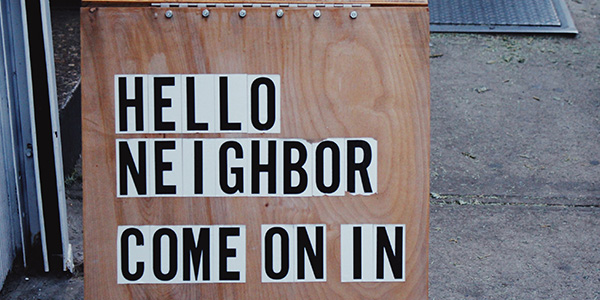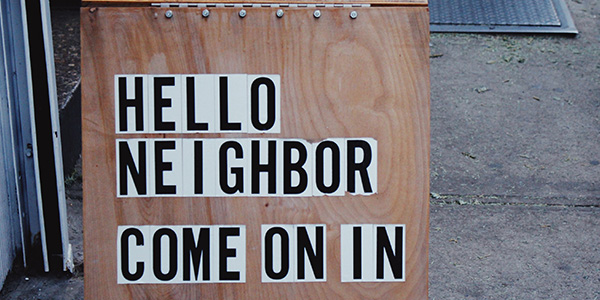Employees at Christian Care Ministry had the privilege of hearing from Michael Alexander, VP of Software Engineering and Technology, during our morning chapel service recently! Here are some great takeaways from his encouraging teaching that we wanted to share with you all:
The message I would like to bring to you today is titled, “Won’t You Be…My Neighbor?”
Mr. Rogers has always been a role model of mine…since I personally struggle with “gentleness,” and I like to look to the example he set regarding what it means to lead a gentle life. I honestly keep a cardigan sweater at my desk as a continual reminder to be gentle.
Ever since a trip I took to Guatemala back in May, there have continued to be moments where the Spirit has been pressing two (2) ideas into me:
- We need to be in close community with one another, and
- We need to love our neighbors as we love ourselves.
During that trip, I saw communities of people supporting each other with food and watching each other's children. I experienced people with love in their hearts who were willing to travel many hours and endure difficult journies just to be able to serve others in need. Most importantly, I saw people who followed the Lord's calling, sacrificed a life of comfort and convenience in their home country, and who live each of their days thinking about how they can serve those in need around them.
Witnessing all of this really made me more acutely aware, since coming back, how very isolated we've become in American society. I don't just mean because of COVID in the last few years, rather I think this has been slowly shifting for decades.
The past few years have been especially rough though... I think coming out of the pandemic, even the introverts were saying: "I need to get out and be around some people, y'all!"
There is a craving for community and fellowship inside all of us. Our hearts cry out to love others because we were made in the image of the Creator who made us and loves us.
As I was preparing for this message, there were two verses that kept jumping out at me:
"Do unto others as you would have them do unto you." - Matthew 7:12
"Love your neighbor as yourself" - Matthew 22:39

At first glance, these two may seem like a simple restatement of the other, but I think there are subtle differences. When we are told to "Love others as we love ourselves," we can struggle to understand that meaning, as we turn inward and think about how we really love ourselves.
- What does it mean to love yourself?
- If we can figure that first part out...then, what exactly does it mean to love others that same way?
If you're like me, and you spend too much time thinking about this, you might actually give the enemy a foothold to start speaking doubt and guilt into how selfishly you think about your own wellbeing and needs over the needs of people around you.
Ever since that day in the garden, when the deceiver tricked humanity into gaining that knowledge of judgment, we have been prone to judge ourselves and others harshly, and we have forgotten what it means to simply love ourselves and others.
This is why we are called to Action, and why the Bible gives us the command to "Do unto others as you would have them do unto you".
When we are doing...we aren't thinking...we are acting in the moment and are fulfilling a need for someone else.
But what about the people who aren’t easy to love? What about those who don’t agree with us, those with whom we have fundamental differences?
What about those who have made life choices we look down on or those we just don’t get, who seem to be angry or want to argue all the time, who seem to work against our values?
There’s nothing humanly possible about following the laws and commandments of the Bible because it’s not something we as humans are meant to do alone.
We need the support of community and we need the help of the Father.
By recognizing our desperate need for a Savior we are granted the gift of possibility. A possibility that allows us to move beyond our brokenness and into a life of purpose, finding our “enough” in Him who loves us so much that He came into this ugly world - while we were still sinners - and died in our place (Romans 5:8).
What Does The Bible Say About Loving Others?
Leading up to this morning, I really tried to understand what the Bible tells us about how we are to love others. In my studies, I came across the word Agape, which I’d always been taught to understand as Love, as in the selfless love that God has for us.
However, I’d never really equated it with the word that is used by some biblical translations such as the King James Version the word Agape is often translated as Charity.
There are plenty of passages that speak of the importance of love in general, but the Bible speaks of charity to point us to a specific kind of love.
1 Corinthians 13 tells us charity is the love toward others...
- that suffers long with them and is kind;
- that does not behave unseemly, seek to get its own way, or is easily provoked;
- that rejoices not in the iniquity of others;
- that bears, believes, hopes, and endures.
Many times when charity is mentioned in English bibles, it refers to the "love of God" which is a spiritual love that is extended from God to man and then reflected by man, who is made in the image of God, back to God.
God gives man the power to act as God acts (God is love), man then reflects God's power in his own human actions towards others.
Today, people often think of charity as nothing more than giving money for some good cause. However, the Bible strongly contrasts the charity it proposes to the misunderstood charity of giving funds.
1 Corinthians 13:3 in the King James Version states: "And though I bestow all my goods to feed the poor, and though I give my body to be burned, and have not charity, it profiteth me nothing."
According to this verse, it is possible to give all your goods to feed the poor and yet not have charity. Therefore, the giving of funds is not truly the Biblical meaning of charity.
How Did Jesus Model Charity?
Some form of the word charity is found in the Bible 29 times. All of these references are in the New Testament. In fact, the word does not occur in any form in the Bible until the book of Romans. I believe this is because we needed to learn from Jesus how to truly love others, in the ways in which he modeled charity.
There are plenty of examples of how Jesus modeled charity and how he showed what it meant to love your neighbor… but there are five specific examples I wanted to highlight today because I think we can each find something relevant that we can put into practice in our own lives.
1. He invited
One of my favorite stories in the Bible comes from Luke 19, and that is the story of Zacchaeus… and not just because of the fun song many of us learned at Vacation Bible School when we were growing up.
“Zacchaeus was a wee little man…and a wee little man was he…”
To understand why the story of Zacchaeus was so shocking, you need to understand the hated role of tax collectors in 1st-century Jewish society. It was bad enough that corrupt tax collectors made their fortunes at the expense of their countrymen, greedily taxing them beyond what the law required and keeping the difference. But even worse was their collaboration with the oppressive Roman occupiers, of whose domination the tax collectors were a constant reminder.
Perhaps no figure was as universally despised, distrusted, and outright shunned by his own people. Tax collectors were considered ritually unclean, and to enter a tax collector’s house or even touch his possessions would defile others in turn.
But the same Christ who enters into our lives and changes our sinful hearts into something more closely resembling Himself, also entered the house of the tax collector and transformed this man.
That very day, Scripture tells us, Zacchaeus made this stunning act of charity: “Zacchaeus stopped and said to the Lord, ‘Behold, Lord, half of my possessions I will give to the poor, and if I have defrauded anyone of anything, I will give back four times as much.’”
Most people of the era would never have given Zacchaeus the time of day, but Jesus sensed in him an openness and willingness to listen—and the grace of Jesus’s friendship altered the course of Zacchaeus’s life. Some traditions hold that Zacchaeus even became a bishop in the early Church.
At the simplest level, this story shows us how Christ treated those who disagreed with Him.
When he first met Jesus, Zacchaeus was living in outright opposition to the Gospel, yet Jesus treated Him with perfect respect and kindness. Zacchaeus’s conversion is a powerful reminder that no one is so lost they can’t be redeemed: “For the Son of Man has come to seek and to save that which was lost.”

2. He reached out
Back in Biblical times, leprosy was considered a very serious disease with many social and religious implications. Lepers were considered unclean and were separated from others. The law required that a leper stay excluded from society. The leper described in Mark 1:40-45 breached this code by approaching Jesus, and Jesus violates it by touching the leper.
“A man with leprosy came to Him and begged Him on his knees, ‘If you are willing, you can make me clean.’ He reached out His hand and touched the man. ‘I am willing,’ He said. ‘Be clean!’ Immediately the leprosy left Him, and he was cleansed.”
The leper broke social conventions and the law in his desperate attempt to get help. Regulations governing those suffering from leprosy required that they keep distant from those who were not afflicted, but this man came right up to Jesus and faithfully asked for help. In Leviticus 5:3, there’s a law forbidding anyone to touch a leper. But Jesus knows our hearts, not our afflictions.
What can we learn from this story? Jesus reached out and touched people with immeasurable love. He embraced the leper without hesitation.
How long had it been since the leper felt the grasp of another hand? There had been no kiss, no hug, no handshake, no touch of another person all the years of his leprosy. This lonely outcast sought the embrace of his Savior.
The touch of Jesus was an outward sign of compassion in the heart of the Lord for this man as well as all of us—God’s children.
3. He showed mercy
One day, the scribes and Pharisees brought to him a woman who had been caught in the act of adultery. They reminded Him the law required her to be stoned and asked what He thought they should do. Their goal wasn’t to seek advice but to trap Him. The world couldn’t influence how Jesus treated others, however.
He knelt down, writing in the dirt as if He hadn’t heard them. They continued to ask and He responded, “He who is without sin among you, let him cast the first stone”.
Chastened, the men began to leave. When Jesus and the woman were alone, He asked her if any accusers remained, and she said there were none. He gently told her he didn’t accuse her either – but warned her not to repeat this sin again.
This is one of the more powerful examples of the Savior’s charity. He rescued her from humiliation and death, preserved a certain amount of dignity by refusing to judge her worthiness for His help, and counseled her on how to avoid the same problem in the future.
This is the difference between what we can do and what we ought to do when dealing with others around us who are going through difficult life situations.
4. He provided
The story in Luke 9:12-17 is often called “The Feeding of the 5,000”.
The plot of the story is simple…. Thousands of people gathered in a “remote place” where Jesus was teaching and healing them. When it came time for the evening meal, there was nothing for people to eat other than five loaves of bread and two fish. From these, however, Jesus was able to provide ample food for the whole crowd. He miraculously multiplied the quantity of food so that everyone was well fed and there were twelve baskets of leftovers.
Not unlike Jesus’ healing miracles, his feeding of the crowd shows his compassion for human beings and their needs. Jesus cared for the people in their ordinary hunger and demonstrated loving hospitality. Feeding the hungry is both an act of compassion and a demonstration of the presence of God’s kingdom.
Through our efforts to care for human needs and to offer hospitality to people, we are able to participate in the kingdom ministry of Jesus.
5. He loved
In Luke 18:15-17 we are told: "People were also bringing babies to Jesus for him to place his hands on them. When the disciples saw this, they rebuked him. But Jesus called the children to him and said, 'Let the children come to me, and do not hinder them, for the kingdom of God belongs to such as these. Truly I tell you, anyone who will not receive the kingdom of God like a little child will not enter it.'”
MOST of us would not rebuke a child going to Jesus.
When Matthew, Mark, and Luke recorded this event, children were rebuked just like the tax collectors. They were not thought to be worthy of the “Master’s” time.
Jesus, of course, hung out with all sorts of unworthy people.
Despite having seen Jesus show special care for the dismissed and powerless, the disciples still thought they needed to protect Jesus from the people He was there to see. Jesus taught the disciples that in the kingdom of God, the powerless, like children, are most welcome.
The kingdom is open to those who come humbly with no illusions that they belong there. Here, Jesus says that leaders in His ministry must not only accept the powerless, but they must also recognize they are powerless as well.
When we study the passages above in depth, we learn Jesus is not only talking about children but us adults as well.
Benefits of Service:
As I get older and realize that much of what we think we’re “discovering” anew are actually things that countless generations before us have learned and shared…if we are humble enough to listen and learn.
As I learn this wisdom from the Bible and from my own walk with God…I sometimes like to look around at the world and see what sort of new “discoveries” are being made. Here’s what I've found:
Studies show that giving can actually boost your physical and mental health (Good news in today’s world where many people are suffering from the emotional complications of a global pandemic). From volunteering at a soup kitchen to committing to raising money for a specific charity, health benefits associated with giving can include:
- Lower blood pressure
- Increased self-esteem
- Less depression
- Lower stress levels
- Longer life
- Greater happiness and satisfaction
According to one study, people who were 55 and older who volunteered for two or more organizations were 44% less likely to die over a five-year period than those who didn’t volunteer — even accounting for many other factors including age, exercise, general health, and negative habits like smoking.
Another study found similar numbers in elderly people who gave help to friends, relatives, and neighbors, or who gave emotional support to their spouses versus those who didn’t.
Furthermore, the researchers found a stronger link between kindness and “eudaimonic” well-being (which has to do with finding meaning in life) than between kindness and “hedonic” well-being (which has to do with happiness and positive feelings).
There is evidence that during gift-giving behaviors, humans secrete “feel good” chemicals in our brains, such as serotonin (a mood-mediating chemical), dopamine (a feel-good chemical), and oxytocin (a compassion and bonding chemical).
When you look at the functional MRIs of subjects who gave to various charities, scientists have found that giving stimulates the mesolimbic pathway, which is the reward center in the brain — releasing endorphins and creating what is known as the “helper’s high.”
Challenge / Encouragement
We, as the Church, are the people of God.
- Why do we want to lend a helping hand?
- Why do we speak up when we see someone being treated unfairly?
- What inspires us to do good?
Simply put, we are made that way. God designed us for charity. Jesus showed us how to serve others with charity, and the Holy Spirit supports us to answer this call to live in charity every day of our lives. Doing good is in our nature, it is part of our purpose, and it is how we live our faith.
When we live in charity, care about the common good, and work for justice, we are acting in solidarity with others, honoring God, and growing in character and in faith.
Ask yourself:
- In our lives today, how can we invite, reach out, show mercy, provide, and love like Jesus?
- Who is in need in our family, community, and world?
As we work for our communities and serve one another with charity, we are evangelizing. Evangelizing is when we spread the Good News about Jesus Christ and His Gospel. We do it with our words and how we live our lives. By our loving actions, we are providing witnessing of our faith. We are saying, “You matter, God loves you, and so do I.”
We are saying: “Won’t You Be My Neighbor?”
As Jesus said, “By this, everyone will know that you are my disciples, if you have love for one another.” (John 13:35).






